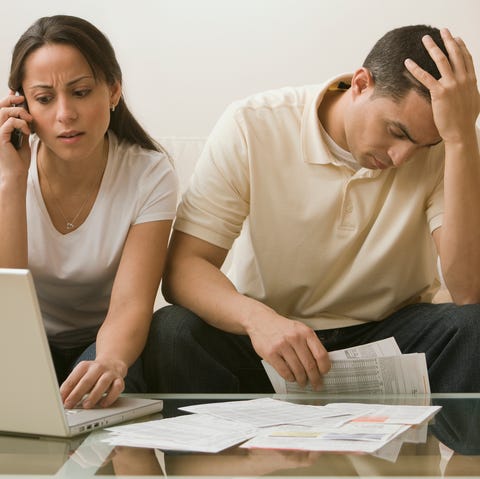If you’re been feeling angrier during the spread of the coronavirus COVID-19, Jeremy Tyler, Psy.D., hears you.
“Whether it’s folks I provide clinical services to, friends, family, or people I’m just chatting with—I’m hearing a lot of frustration and anger,” he says. Tyler is an assistant professor of clinical psychiatry and a director at Penn Medicine’s Center for the Treatment and Study of Anxiety.
“And a lot of people are feeling angry and they don’t know why,” he says.

Khosrork
There is, after all, a lot be be angry about. The response (or lack thereof) of local government. The response (or lack thereof) of state government. The response (or lack thereof) of federal government. The response (or … you get the point) of world governments. Self-quarantine stir-crazies. Job loss and the subsequent inability to pay bills. Grocery store madness.
So, why, exactly is the coronavirus COVID-19 creating so much anger? Is that anger natural? Healthy? How much anger is too much anger? And is there anything you can possibly due in order to feel more at peace with the pandemic?
Take a deep breath and allow Tyler to offer some professional understanding and advice.
Why am I feeling so angry during the coronavirus COVID-19?

skynesher
Because the pandemic and its effects are things that you can’t control, says Tyler.

Subscribe to Men’s Health
SHOP NOW
“The way you live your life has been dramatically changed and you don’t have control over those changes. When we don’t have control, there is an opening for negative feelings like anger,” Tyler says. “And anger can take many forms: frustration, feeling ticked off, being inconvenienced—all the way up to rage.”
The pandemic is unlike, say, work. If you’re pissed at work, you can blame your boss. But if you’re pissed off in self-quarantine, who or what you blame can vacillate wildly.
“Depending on your context of the situation, you might be angry at the president, your governor, your neighbor because they’re out and not obeying quarantine, or the person who took the last bit of toilet paper at the grocery store,” Tyler says. “I think that we’re all making sense of this situation as it develops.”
And that can result in a feeling of losing control, which can lead to confusion, which can lead to anger.
Is it normal to feel angry during the pandemic?

Jose Luis Pelaez Inc
Not only is it normal, it’s healthy (to an extent), Tyler says.
“This a potentially traumatic global experience,” he says. “We’ve never gone through anything like this. We’ve seen disasters, wars, and terrorist attacks. This is a different thing than all of this. When individuals or groups or cultures are exposed to this amount of impact in their daily life, anger is a natural emotion that comes up. If at any point we didn’t feel anger, I’d be worried.”
Anger is healthy because it’s natural and normal, says Tyler. That said…
“However, if your anger becomes chronic and doesn’t get better it could become a problem,” he says. “It’s healthy if it gets an outlet. When you acknowledge anger, feel it, find an outlet, and do something productive.”
But when you bottle it up, anger becomes unhelpful, says Tyler. That’s when you’re more likely to lash out at others or do something else destructive with your anger.
What can I do to reduce my anger during COVID-19?
While anger is a natural and healthy response to the pandemic, too much anger can disrupt and damage your life and the lives of those around you. For those reasons, it’s important to work through your anger in productive ways. Tyler suggests five.
Do not use social media as “stress relief.”

PeopleImages
“It’s hurling all that anger to no one,” Tyler says. “It’s the modern equivalent of going outside and screaming up to the sky, except that unlike screaming at the universe, on social media, you’re going to get someone that disagrees with you. Getting into an argument with your third-removed cousin who lives in another state is not going to get this resolved.”
In fact, Tyler says, it might even make your anger worse.
“You’re not only bottling up your feelings. You’re shaking the bottle.”
But do share your feelings.
With a real person, such as a partner, a friend, or a coworker. This allows you to better identify what you’re feeling.
“As humans, we rarely feel one emotion at one moment,” Tyler says. “Maybe you’re feeling angry, but also worried about your finances. Talking with someone can help you discover what other feelings are accompanying the anger.”
And if you can better identify those additional factors, you can better handle the next step.
Do what you can do.
Working with more concrete things can help you regain feelings of control, says Tyler.
For example, if you are worried about your finances, Tyler suggests turning to productive actions to address that worry. Calculate how much money you’re going to receive from the stimulus package. Call your mortgage company to see what alternative payment options they may have to offer. Do the same for your utility companies.
Take care of yourself.
Eat well. Limit your alcohol intake. Exercise. Turn off the news. Meditate, if that’s something that helps you. Set up a Google Hangout with friends or family.
It sounds obvious, but it’s important, says Tyler.
And if all else fails…
Get a dog.

Gary Barnett / EyeEm
“We adopted a puppy,” Tyler says. “It’s interesting because we used to have the news on every day. This last weekend, when we had the puppy in the house, we realized that we didn’t have the news on. It was a nice realization.”
Source: Read Full Article
